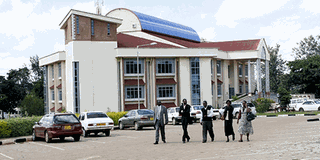Muliro university joins war on poverty in Busia

File | DAILY NATION
The building that houses the library at Masinde Muliro University of Science and Technology in Kakamega County, western Kenya.
What you need to know:
- A community-based organisation has invited Masinde Muliro University to help improve the livelihoods of communities in parts of western Kenya through research-based innovation
A project to alleviate poverty in a number of districts in western Kenya now has Masinde Muliro University of Science and Technology (MMUST) on board. The university’s role in the Sh3 billion programme is to strengthen the search for sustainable solutions through technological research and innovation.
The partner that has sought the support of the university is the Busia-based Programme for Agriculture and Livelihoods in Western Communities (PALWECO), whose aim is to reduce the prevalence of poverty and improve the livelihoods and living standards of the poor communities in Busia, Butula, Bunyala, Nambale, Samia, Teso North, and Teso South districts.
The average poverty index in the seven districts is about 60 per cent, with Busia being one of the worst hit. The key developmental challenges in this county arise from low agricultural productivity, poor access roads, and poorly maintained market infrastructure.
The Kenya Integrated Household Budget Survey of 2009/2010 found the poverty level in Busia to be 69 per cent. The national average is 46 per cent.
PALWECO programme director Sakwa Mwangala says the joint project with MMUST will focus on improved nutrition and food security by working to increase access to social and agricultural financial capital, improve access to markets, improve services through secondary and feeder roads, and to make available local market and storage infrastructure.
Through the project, MMUST becomes one of the few universities to join a local organisation to find practical solutions to problems facing nearby communities.
The project, says Mr Mwangala, aims to raise the average household income in the area from Sh1,239 to Sh8,000 in 2016.
Prof J. O. Shiundu, the MMUST deputy vice-chancellor and head of research and agricultural extension services, says the partnership will also help PALWECO to mount studies in areas where the university’s knowledge base coincides with the identified needs of Busia county.
“We believe that an educated society is easier to govern and develop than one which is not educated,” says Prof Shiundu. He adds that MMUST will offer technical expertise to help tackle some of the problems in agricultural production and soil and water management practices.
The partnership, he adds, will also create opportunities for internship and practical work assignments for university students and expand the network between communities and educational institutions for the benefit of all concerned.
“PALWECO approached us to work with them in reducing poverty in the region through research to find solutions to the problems. This will open room for more studies on food security in the country,” Prof Shiundu explains.
The university will create awareness among farmers by training them on value addition in agricultural production. To that end, the School of Agriculture and Veterinary Sciences will extend support to farmers in Busia and Kakamega.
The PALWECO project will further focus on how to tackle food shortages caused by post-harvest losses, besides addressing the problem of farmers selling crops at low prices to middlemen out of desperation.
According to Prof Shiundu, the university is trying to create awareness among farmers to embrace drought-resistant crops like sorghum, millet, and wheat, which do well in the region, instead of insisting on planting maize.
The university is involved in research, education, and training in various agricultural skills and health, which are believed to be crucial to the success of the project with PALWECO.
The programme will also focus on increasing access to social and agricultural financial capital, improving access to markets, improving services through secondary and feeder roads, and making available local markets alongside storage infrastructure.
In the end, the project aims to increase agricultural productivity and lead to the creation and strengthening of value chain platforms.
It also hopes to promote and support youth entrepreneurship initiatives.
PALWECO is financed by the governments of Kenya and Finland, with the Finnish government providing a 27 million euro grant (about Sh3 billion) and the Government of Kenya offering Sh347 million.




